Did you know Charlotte neighborhoods are among the fastest-growing in the United States? With a population boom that’s transforming the Queen City , Charlotte has become a top destination for families, young professionals, and retirees alike. Whether you crave lush green spaces, historic charm, vibrant nightlife, or easy access to work and schools, this Charlotte neighborhood guide will help you navigate the city’s most sought-after communities—and unlock the secret to finding your ideal place to call home.
Discover Your Perfect Match: Insights From the Charlotte Neighborhood Guide
The Charlotte neighborhood guide is more than a list of zip codes; it’s your key to understanding the unique vibes, amenities, and atmospheres across this dynamic city. Charlotte stands at the crossroads of tradition and innovation, seamlessly blending historic charm with rapid modernization. From family-friendly streets bordered by maple trees to bustling arts districts and lakeside retreats, there’s a Charlotte neighborhood for every lifestyle. Below, you’ll find practical examples and tips to help you identify the features that matter most—like proximity to Uptown, green space access, or top-rated schools—so your next move is your best move.
Consider Myers Park for timeless elegance, Plaza Midwood for eclectic culture, University City for campus life, Madison Park for urban-suburban balance, South End for a cosmopolitan vibe, Lake Wylie for waterside living, and NoDa for artistic inspiration. The diversity means you can tailor your housing search according to your values—whether that means being minutes from live music, having easy access to the Lynx light rail, or living steps away from sprawling parks like Freedom Park and Revolution Park.
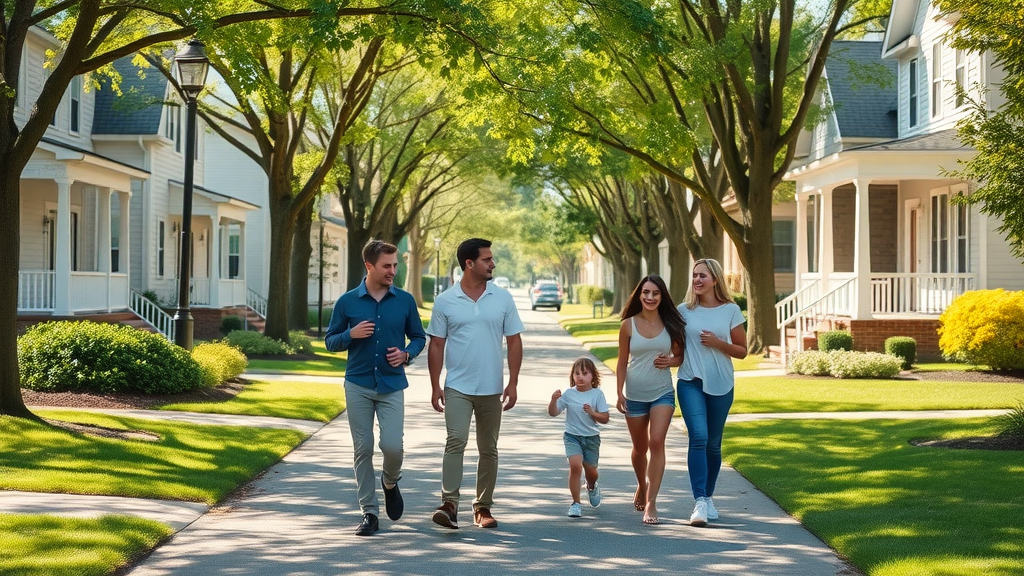
Did You Know? Charlotte Neighborhoods Are Among the Fastest-Growing in the U.S.
It’s no secret that the city of Charlotte is expanding at a rapid pace. Newcomers from across the country are drawn by job growth, a thriving cultural scene, and exceptional recreational offerings. This surge means many Charlotte neighborhoods are evolving quickly, adding new amenities, improving transit options, and upgrading infrastructure to meet the needs of residents new and old. As a result, choosing the right neighborhood today matters more than ever, ensuring your home investment grows along with the city.
Navigating Charlotte Neighborhoods: Essential Steps to Choosing Your Next Home
When using the Charlotte neighborhood guide , the decision-making process goes beyond basic amenities—it's about aligning your lifestyle with the character of each area. Start by considering your daily needs: Do you require quick highway access for a work commute, or is walkability to shopping and dining options at the top of your list? Maybe quiet streets or access to green spaces like Freedom Park are non-negotiable, especially for families and pet owners. Each Charlotte neighborhood offers its own blend of benefits, and the key is to define your preferences early in your search.
As you evaluate different neighborhoods, use tools like comparative tables, GIS map overlays, and local resident reviews to gather a full picture of each area. Explore details such as crime rates, average commute times, zoning for top-rated schools, and the proximity to shopping centers or entertainment. Touring multiple neighborhoods at various times of day can also provide vital insights into community rhythm and safety, helping you steer clear of areas that may look appealing on paper but feel different in person.
Defining Your Priorities With the Charlotte Neighborhood Guide
Before you leap into house hunting, outline your priorities—this is where the Charlotte neighborhood guide becomes truly invaluable. Ask yourself: Do you value historic homes and established trees, as found in Myers Park? Is the vibrant energy of Plaza Midwood, with its thriving food and music scene, a better fit? Or does your family need suburban comfort with easy access to top schools, as in Madison Park or University City? By listing your "must-haves" (and "nice-to-haves"), you’ll quickly narrow down your options and focus on neighborhoods that genuinely align with your way of life.
Use digital planning tools, connect with real estate professionals, and consult local friends or community groups to gather advice. Review neighborhood guides and city planning maps, taking note of future developments that could impact property value and livability. Your priorities will not only inform your current move but will also help ensure that you choose a Charlotte neighborhood where you can thrive long-term.

Why Understanding the Queen City’s Diversity Is Key to Your Move
Charlotte—affectionately known as the Queen City —offers a mosaic of neighborhoods, each with its own culture, demographics, and housing market. Understanding this diversity is vital, especially as some areas are historic, walkable, and close-knit, while others are growing hubs of innovation, home to tech startups and creative industries. For newcomers, the Charlotte neighborhood guide helps demystify what each area offers, from the artsy vibes of NoDa (North Davidson) to the luxurious greenery of Myers Park or the commuter-friendly advantage of South End. Factor in this diversity as you consider schools, job markets, and recreational opportunities, ensuring that your move is both strategic and satisfying.
The ability to choose from a wealth of different communities means Charlotte truly offers something for everyone. Whether you’re seeking a neighborhood in Charlotte with deep roots and tradition or one brimming with youthful excitement, understanding the broader context of the Queen City is your first step toward a successful, happy relocation.
| Neighborhood | Vibe | Main Attraction | Commute to Uptown | Median Home Price |
|---|---|---|---|---|
| Myers Park | Historic, Elegant | Tree-lined streets, historic homes | 10-15 min | $1,000,000+ |
| Plaza Midwood | Trendy, Artistic | Bars, art galleries, dining options | 10 min | $650,000 |
| South End | Urban, Energetic | Light rail, nightlife, breweries | 5 min | $600,000 |
| University City | Suburban, Family-friendly | UNC Charlotte, shopping | 15-25 min | $420,000 |
| Madison Park | Quiet, Convenient | Parks, proximity to SouthPark Mall | 10-20 min | $450,000 |
| Lake Wylie | Scenic, Relaxed | Lakeside recreation, boating | 25-35 min | $550,000 |
| NoDa (North Davidson) | Creative, Bohemian | Live music, murals, food | 12-15 min | $500,000 |
Spotlight on Myers Park: Timeless Elegance in Charlotte Neighborhoods
Few areas of the Charlotte neighborhood guide command the prestige of Myers Park . Known for its grand historic homes, lush tree canopies, and manicured green spaces, Myers Park is often the first stop for new residents seeking an air of refinement just moments from city amenities. It blends exclusivity with accessibility, placing residents near sites like Freedom Park and the esteemed Myers Park Country Club, while still only a short drive to Uptown Charlotte. If your vision of home includes classic southern architecture, quiet sidewalks, and top schools, Myers Park stands out as one of the most desirable neighborhoods in Charlotte.
The neighborhood’s famed boulevards, especially Queens Road West, are lined with dogwoods and oaks, giving each street a sense of permanence and grandeur. Myers Park’s homes come in many architectural styles —from stately Georgian to elegant Colonial Revivals—offering both historical richness and modern luxury. For those who prioritize historic charm, accessibility, and a strong sense of community, few places match Myers Park in value and atmosphere.
Architectural Heritage and Green Spaces in Myers Park
Myers Park is an architectural showcase brimming with historic homes and elegant colonnades. Walking the neighborhood, you’ll find everything from classic Tudor designs to Mediterranean-inspired villas, all framed by green spaces and meticulously landscaped lawns. The neighborhood is also home to Freedom Park , a sprawling recreational haven with walking trails, lakes, and community events that draw locals from across the city. The park further enhances Myers Park’s reputation for providing an idyllic, family-friendly lifestyle within a city setting.
Beyond its visual appeal, Myers Park offers tranquility and proximity to essentials. Mature trees provide cool shade throughout the summer, and the abundance of sidewalks encourages outdoor activity, be it jogging, dog walking, or picnics under the oaks. These features, combined with an active neighborhood association, help maintain safety and enhance property values, making Myers Park a staple in every Charlotte neighborhood guide .
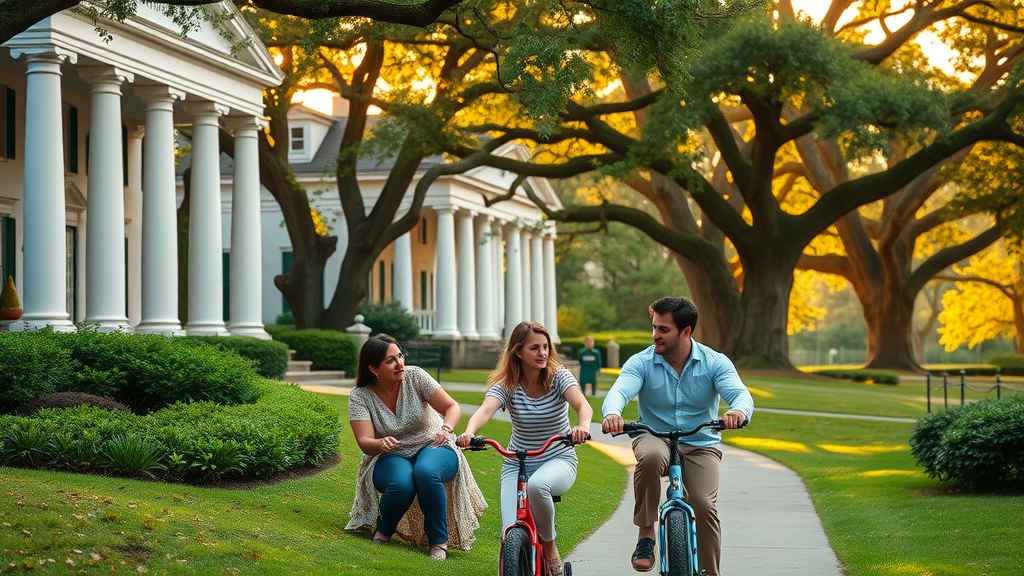
Schools, Amenities, and Lifestyle: Living in Myers Park
One of the key draws for families is the availability of top-rated schools such as Myers Park High, along with access to cultural centers, tennis courts, and private clubs like Myers Park Country Club. Shopping and dining options are plentiful, with boutiques, restaurants, and bakeries nearby, as well as quick access to both SouthPark Mall and Uptown Charlotte. Residents can enjoy the safety and serenity of the area, while still being moments from the city’s business and entertainment districts.
Myers Park’s community-oriented design fosters neighborly connections, evening strolls, and active participation in local events. The blend of tradition, educational excellence, and location has made Myers Park one of the gold standards for residential living in Charlotte neighborhoods, attracting everyone from executives to growing families and retirees.
Plaza Midwood: Trendy Charlotte Neighborhood With Easy Access
If you’re seeking an eclectic, energetic atmosphere with easy access to both Uptown and hip local venues, Plaza Midwood is a must-see in the Charlotte neighborhood guide . Plaza Midwood is renowned for its vibrant mural-covered streets, locally owned boutiques, and a food scene that runs the gamut from venerable diners to gourmet, chef-driven spots. Young professionals and creative types flock here for a lifestyle defined by art walks, weekly farmers’ markets, live music, and spontaneous pop-up events, making it one of the most lively Charlotte neighborhoods to explore.
Historic homes nestle beside trendy apartment buildings and quirky businesses, all within walking distance to favorite destinations like Veterans Park and numerous cocktail lounges. The neighborhood’s accessibility to Uptown via Central Avenue and its close-knit vibe position it as a perennial favorite for those who want convenience without sacrificing character.
Art, Eats, and Energy: Plaza Midwood’s Vibrant Culture
Plaza Midwood thrives on creative energy: local artists fill galleries and studios, murals brighten otherwise quiet alleys, and an ever-growing dining scene brings together cuisine from around the globe. The neighborhood pulses with life, especially after dark, when live music pours from open venues and neighbors gather at local breweries. Access to food, music, and art means you’ll never be at a loss for things to do or new flavors to try—just one reason this area draws such a dedicated following in every modern Charlotte neighborhood guide .
Events like gallery crawls and block parties are routine, and it’s easy to join in the community’s causes, from sustainability projects to supporting locally owned shops. The spirit of Plaza Midwood is inclusive, youthful, and ever evolving, contributing to its status as a destination for singles, couples, and young families who want to be at the heart of Queen City’s cultural renaissance.
Community Vibe: Why Plaza Midwood Appeals to Young Professionals
With a dynamic mix of refurbished historic bungalows and new residential developments, Plaza Midwood attracts young professionals seeking both flexibility and excitement. The neighborhood’s location means short commutes to Uptown and easy access to Charlotte’s business districts. It’s not uncommon to find residents walking or cycling to their favorite coffee house or brewery after work. The area also hosts a number of coworking spaces and business incubators, making it an ideal spot for entrepreneurs and remote workers.
Community involvement is high, and there’s a palpable sense of belonging among residents, reinforced by local volunteer drives and shared green spaces. Plaza Midwood’s balance of work, play, and community makes it one of the most desirable up-and-coming neighborhoods in Charlotte.
University City: Growing Hub for Families and Students in the Charlotte Neighborhood Guide
University City is a prime illustration of how Charlotte neighborhoods adapt and grow to meet changing needs. As home to the University of North Carolina at Charlotte, this area combines vibrant campus life with broad suburban amenities. University City is tailor-made for families, students, and faculty seeking affordability, convenience, and suburban tranquility—all with easy access to Uptown via I-85 and the Lynx Blue Line. Ample shopping, abundant parks, and top-rated magnet schools contribute to the area’s rising popularity within the Charlotte neighborhood guide .
The region’s population growth has prompted the development of new housing options, from student apartments to single-family homes in master-planned communities. With all necessities—from grocery stores to fitness centers—just a short drive away, University City is a magnet for those who want both space and connectivity within the Charlotte area.
Campus Life Meets Suburban Living in University City
The blend of university energy and suburban comfort makes University City a unique offering in the Charlotte neighborhood landscape. On one hand, there’s the hustle of campus events, athletic matches, and cultural activities. On the other, you’ll find tranquil walking trails, family playgrounds, and lakefront spots perfect for picnics or kayaking. Residents can enjoy the best of both worlds: live music at the PNC Music Pavilion one night and a serene stroll along the Mallard Creek Greenway the next morning.
Because the area is a key educational hub, it also boasts a range of after-school programs, tutoring centers, and enrichment clubs, making it especially appealing to families with school-aged children. The community unites around both academic and recreational events, contributing to a friendly, supportive atmosphere that’s reflected in positive resident feedback and rising home values.
Affordability and Easy Access to City Center: A University City Overview
One of University City’s marquee selling points is its relative affordability compared to more historic or central neighborhoods. Both renting and buying are more accessible, with a wide range of housing inventory available. First-time buyers and graduate students often target the area, drawn by competitive home prices and lower cost of living, as well as the vital connection via the light rail for commutes into Uptown. University City also sits close to major corporate hubs like University Research Park, making it a favorite for young professionals and families alike.
Between its robust shopping centers, nearby medical facilities, and ongoing infrastructure projects, University City’s appeal is unlikely to wane. As one of the fastest-growing neighborhoods in Charlotte, it stands out as an ideal place to lay down roots and watch your household and investment flourish.
Madison Park: Hidden Gem Among Charlotte Neighborhoods
Tucked between the bustle of SouthPark and the action of Uptown, Madison Park represents the sweet spot for buyers seeking a peaceful, residential atmosphere with immediate city access. This Charlotte neighborhood is cherished for its roomy, tree-shaded lots, diverse housing stock, and neighborly feel. With established ranches, split-levels, and occasional new-builds, Madison Park’s housing options deliver notable value, ideal for first-time homebuyers and move-up shoppers alike. The neighborhood’s proximity to Park Road Shopping Center and direct access to Park Road, South Boulevard, and Woodlawn Road make venturing into the broader city easy and convenient.
Madison Park’s unbeatable location is further enhanced by strong community engagement and an active neighborhood association. Annual block parties, seasonal events, and local initiatives keep connections strong, creating a "small town in a big city" sensation that so many Charlotteans desire.
Balancing Quiet Living and Urban Access in Madison Park
One of Madison Park’s defining qualities is its ability to offer tranquil, suburban living while maintaining easy access to premier destinations in Charlotte. You can enjoy peace and quiet on a shady avenue, then hop over to SouthPark Mall, check out the dining options at Park Road, or catch live music in South End—all within a short drive or even a bike ride. For those who work in Uptown, commutes are straight-forward via the Lynx Blue Line, Woodlawn station, or major arterial roads.
The neighborhood’s walking trails and playgrounds offer opportunities for relaxation and recreation, and pet owners prize the walkable, dog-friendly streets. With its combination of serenity, centrality, and affordability, Madison Park has evolved from a well-kept secret into a prime choice for those who want to balance privacy with participation in Charlotte’s urban scene.
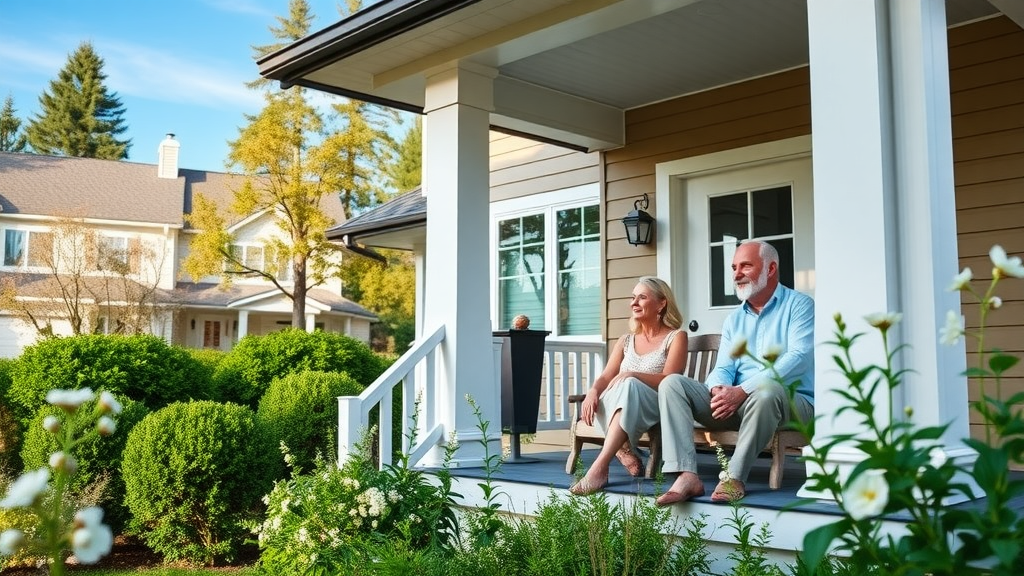
Housing Options and Attractions in Madison Park
Madison Park stands out in the Charlotte neighborhood guide for its flexible housing pool. Classic mid-century ranch homes on large lots attract retro enthusiasts, while new construction and tasteful renovations appeal to those prioritizing modern layouts. The neighborhood also offers garden condos and townhouses for those who want low-maintenance living. Key attractions include Marion Diehl Park, which offers sports fields and recreation, and the proximity to both SouthPark Mall for shopping and the Little Sugar Creek Greenway for outdoor exercise.
For dining, the area boasts popular local eateries and bakeries, particularly in the Park Road Shopping Center and along South Boulevard. The neighborhood’s safety, friendly atmosphere, and easy access to top education and retail make it a smart pick for buyers seeking enduring value and a true sense of community.
"Charlotte's neighborhoods blend the charm of tradition with the promise of growth, making it an ideal place to call home."
South End: Urban Lifestyle Central in the Charlotte Neighborhood Guide
South End exemplifies the modern, urban core that many young professionals and creatives seek. With sleek apartments, hip coworking spaces, and a nightlife scene that buzzes throughout the week, South End has become a magnet for those who want to live, work, and play in the heart of Charlotte. Easy access to the Lynx light rail puts residents minutes from Uptown, while nearby breweries, art galleries, and acclaimed dining options ensure there’s always something happening just steps from your door. South End is frequently highlighted in the Charlotte neighborhood guide for its focus on contemporary living, making it a top pick for anyone chasing an active urban lifestyle.
The area’s revitalized warehouses now house everything from tech startups to yoga studios, and the Rail Trail invites joggers and cyclists to explore an ever-evolving corridor filled with public art. If you’re after cosmopolitan amenities and the quick pace of city life, South End should be at the top of your Charlotte neighborhoods list.
Transit-Oriented Development and Easy Access in South End
South End owes much of its popularity to transit-oriented design. The Lynx Blue Line runs directly through the neighborhood, offering easy access to key business and entertainment districts, as well as neighboring communities. This convenience attracts commuters, students, and executives alike, while expanding mixed-use developments provide everything you need—boutiques, gyms, and open-air markets—all within walking distance. The integration of light rail service ensures high demand for residential and commercial real estate, boosting property values and fueling ongoing development throughout the district.
For those who value a car-optional lifestyle, South End’s walkability is a game-changer. Ample bike lanes, pedestrian corridors, and convenient parking make it a seamless transition from home to work, dinner, or an evening out. The blend of old and new, from repurposed factories to chic rooftop lounges, gives South End its distinct, ever-evolving character.
Dining, Nightlife, and Arts: Why South End Stands Out
What makes South End such a hot neighborhood in Charlotte? The answer lies in its range of experiences. Whether you crave craft beer at a local brewery, chef-driven cuisine at farm-to-table bistros, or live art and performance events, South End consistently delivers. The Rail Trail buzzes with activity, especially on weekends, and monthly gallery crawls offer a taste of the local arts scene for residents and visitors alike. South End’s unique energy makes it the perfect stage for innovation, bringing together creative talent from all over the Queen City.
Residents also benefit from proximity to parks, pet-friendly amenities, and regular farmer’s markets. If you want your weekends filled with discovery and your weekdays enriched with connection, South End is the kind of Charlotte neighborhood that’s sure to tick all the boxes for convenience and culture.
Lake Wylie: Waterside Living in the Charlotte Neighborhood Guide
For those seeking scenic beauty and outdoor adventure, Lake Wylie offers a retreat from urban hustle while still keeping you connected to everything Charlotte has to offer. Located just south of the city limits, Lake Wylie provides waterfront living with an abundance of green spaces, boating, and water sports. Homes range from secluded lakefront estates to modern subdivisions with lake views and neighborhood amenities. Families and retirees often choose Lake Wylie for its serene environment and robust calendar of community events—outdoor concerts, festivals, and holiday celebrations are regular highlights in the Charlotte neighborhood guide .
Easy access to major highways ensures that even though you benefit from a tranquil lifestyle, Uptown Charlotte is only a short drive away. The area is also known for excellent schools and a strong sense of community, making it a top choice for those prioritizing recreation and relaxation in their next move.
Outdoor Recreation and Community Events Around Lake Wylie
Lake Wylie is a playground for outdoor enthusiasts. The lake itself offers miles of shoreline for kayaking, fishing, and swimming, while multiple marinas and parks—including Fewell and McDowell—provide launchpads for boating adventures and lakeside picnics. Walking trails circle many neighborhoods, offering stunning sunset views and opportunities for wildlife spotting. Regularly scheduled community events—concerts, seasonal festivals, and charity runs—bring neighbors together, creating a friendly, welcoming atmosphere primed for new arrivals.
Besides water-based activities, Lake Wylie’s proximity to the Catawba River and nearby golf courses ensures a robust lifestyle for those who cherish the outdoors. Combined with close-knit neighborhoods and superb access to amenities, the lakeside experience here is second to none in the wider Charlotte area.

Real Estate Trends and Investment Opportunities in Lake Wylie
Lake Wylie’s real estate market is on the rise, thanks to increasing interest in waterside living and ongoing infrastructure investments. While home prices have appreciated significantly over the past decade, there are still opportunities for buyers to find value, especially in new developments and resale homes with strong amenities. Investors have also turned their attention to Lake Wylie, seeking rental properties that attract weekenders and long-term residents alike.
The area’s steady appreciation, coupled with proximity to key employment corridors in Charlotte and the South Carolina border’s tax advantages, mean that Lake Wylie stands out as both a great place to live and an attractive location for smart real estate investment. Whether you’re purchasing your dream home or starting a rental portfolio, Lake Wylie is a prime candidate in the Charlotte neighborhood guide for immediate quality of life and long-term gains.
North Davidson (NoDa): Creative Pulse of Queen City
Welcome to NoDa —Charlotte’s artsy “North Davidson” district, and the undisputed creative heart of the Queen City. Renowned for its street murals, vibrant galleries, eclectic food scene, and an ever-present hum of live music , NoDa draws artists, musicians, and free spirits from across North Carolina and beyond. The neighborhood’s walkability, coupled with easy access to Uptown via the Lynx light rail, makes it a perennial favorite among young professionals and anyone who thrives on creative energy.
NoDa’s history as a mill village is evident in its beautifully restored storefronts and colorful bungalows. The neighborhood pulses with festivals, art crawls, pop-up markets, and bustling nightlife, making every day an adventure and every night an event. If your dream is to live in a Charlotte neighborhood where inspiration is always just around the corner, no area rivals the artistic momentum of NoDa.
Art Galleries, Local Businesses, and the NoDa Neighborhood Spirit
Local pride is as bold as the murals on NoDa’s walls. Dozens of independent galleries, craftsmanship shops, tattoo parlors, and eateries fill just a few walkable blocks, providing endless opportunities for creative collaboration. Each month, events like the NoDa Gallery Crawl bring the community together to celebrate new artists and installations. At night, venues like The Evening Muse and Neighborhood Theatre showcase local bands and touring acts, keeping the spirit of live music alive and well in Charlotte’s most dynamic arts district.
The sense of community here goes far beyond aesthetics—NoDa’s residents organize everything from food drives to historical preservation efforts and green space cleanups. With new mixed-use developments and ongoing transit investments, NoDa’s influence on Charlotte’s cultural scene is poised to grow even stronger in the coming years.

Easy Access: Connecting NoDa to Central Charlotte
One of NoDa’s biggest advantages is its easy access to Uptown Charlotte. The light rail station at 36th Street puts residents just minutes from the city center, while major thoroughfares like North Davidson Street and Matheson Avenue provide additional routes for bikers and drivers alike. The neighborhood is also pedestrian- and bicycle-friendly, making it simple to navigate between NoDa’s attractions, adjacent developments, and the uptown business core.
This level of connectivity ensures that NoDa residents can enjoy the perks of arts district living without sacrificing convenience. Whether you’re commuting to work or heading out for a night on the town, NoDa’s location is ideal for those wishing to balance creativity and practicality in a Charlotte neighborhood.
- Visit neighborhoods at different times of day
- Consider proximity to work, schools, and recreation
- Research current and future real estate trends
- Connect with current residents and real estate professionals
How to Prioritize Easy Access and Commute Times in the Charlotte Neighborhood Guide
With Charlotte’s growing urban sprawl, commute times and transportation options can dramatically shape your daily routine. The Charlotte neighborhood guide highlights the importance of “easy access”—whether through light rail, proximity to highways, or walkability to daily essentials. Start your search by mapping daily routes to work, school, or regular destinations, and consider neighborhoods that minimize your biggest transit headaches. Light rail-accessible areas like South End, NoDa, and University City often command higher demand thanks to their predictable commutes and reduced reliance on personal vehicles.
Additionally, factor in the availability of public transit, the frequency of service, and the walkability to stations or bus stops. Evaluate potential congestion points and understand that certain neighborhoods shine for their centrality, while others balance longer commutes with tranquil settings and larger lots. The art of matching your desired lifestyle with commute realities will help you settle into a Charlotte neighborhood that supports both your schedule and your serenity.
Planning for Transit, Work, and Daily Needs
Careful planning can make all the difference when weighing your housing options in Charlotte neighborhoods. Start with a checklist of requirements: Do you need expressway access for a regional job? Is proximity to top schools or after-school programs non-negotiable? Would you rather walk to favorite coffee shops and music venues, or is a quiet, car-dependent enclave more your style? Identify “pain points” in your current routine and look for neighborhoods where those are minimized.
Don’t forget to test drive your proposed commute during rush hour, consult public transit maps, and spend time in neighborhoods during weekday mornings and evenings. Resources like the Charlotte neighborhood guide can help you compile data on average travel times, route reliability, and even pedestrian-friendliness, all of which will contribute to a smoother, less stressful relocation.
Public Schools, Private Options, and Educational Resources in Charlotte Neighborhoods
Whether you’re raising a family or planning for the future, education is a top concern for many homebuyers—and Charlotte neighborhoods offer some of the best choices in North Carolina. Top public districts are complemented by a wide range of private academies, magnet programs, charter schools, and higher-ed institutions such as UNC Charlotte and Queens University. As you use the Charlotte neighborhood guide , pay attention to school zoning, graduation rates, and enrichment offerings in your desired areas. Not only can this influence your family’s educational experience, but strong schools are also tied to long-term home values.
In neighborhoods like Myers Park, Madison Park, and parts of University City, you’ll find high-performing public schools known for academics, sports, and arts programs. Other areas, such as Plaza Midwood and NoDa, are close to acclaimed charter schools and innovative magnet programs. No matter your educational priorities, Charlotte neighborhoods have options to match.
Mapping the Best Academic Opportunities by Neighborhood
The secret to maximizing educational resources lies in neighborhood research. Consult district maps, review test scores and parent reviews, and ask about after-school programs, advanced placement courses, and athletic teams. Private institutions, such as Providence Day School and Charlotte Latin, attract families from all over the region and often provide specialized curricula and small class sizes. Several neighborhoods are also known for robust early childhood offerings and extracurricular activities—including STEM, arts, and language immersion programs—helping every child find their path to success.
Collaborate with parents, connect with school administrators, and attend open houses to get an insider’s perspective. With Charlotte’s mix of legacy and cutting-edge education, you’re sure to find the right academic fit, no matter which Charlotte neighborhood you choose.
People Also Ask: Charlotte Neighborhood Guide
Which Charlotte neighborhood is best for families?
Explore top-rated family-friendly neighborhoods such as Myers Park and Madison Park , known for excellent schools, plentiful parks, and tight-knit community atmospheres. Both areas consistently rank high for safety, educational resources, and neighborhood engagement in the Charlotte area, making them ideal options for families looking to settle down.
What are the most affordable Charlotte neighborhoods?
Neighborhoods like University City and certain areas in North Charlotte offer more affordable housing, balancing competitive home prices with easy access to key amenities, schools, and transportation. These areas are attractive to first-time buyers, students, and families looking for long-term value.
How do I choose between South End and Plaza Midwood?
South End is renowned for its urban, energetic vibe, upscale amenities, and access to the Lynx light rail, making it a favorite among young professionals. Plaza Midwood offers a historic, artistic setting with a thriving food scene and vibrant nightlife, appealing to those who prioritize creative culture and community events. Your choice depends on whether you favor an ultra-modern urban lifestyle or a more eclectic, laid-back environment rich in local flavor.
Neighborhood Safety and Community Resources: What Every Resident Should Know
Safety and community resources figure prominently in any Charlotte neighborhood guide . Before you select your ideal neighborhood, review current safety data, including police reports, neighborhood watch activity, and recent trends in property crime. Many Charlotte neighborhoods feature active community organizations dedicated to maintaining safe streets, providing social services, and supporting residents through local events.
Research the presence of local fire, medical, and emergency services, as well as resources like libraries, recreation centers, and food pantries. Neighborhood associations are often at the heart of security and support, coordinating everything from holiday festivals to safety patrols. The strength and responsiveness of a community can greatly influence your quality of life, so be sure to investigate these aspects as you review Charlotte neighborhoods.
Safety Data, Public Services, and Local Support Organizations
Online resources such as the Charlotte-Mecklenburg Police Department website allow you to review crime maps and neighborhood alerts. Many communities also have social media groups and newsletters that update residents about street closures, upcoming events, or public safety initiatives. Don’t hesitate to reach out to local associations to hear firsthand about the neighborhood’s safety measures and social culture. The more connected and informed a neighborhood is, the more confident you’ll feel making it your own.
Upcoming Developments in Charlotte Neighborhoods: What the Future Holds
Charlotte is a city on the move. Several large-scale developments are reshaping the landscape, from new light rail extensions and corporate campuses to innovative residential projects and public park expansions. As you use the Charlotte neighborhood guide , pay special attention to future growth—planned mixed-use districts, new school construction, and highway improvements can significantly increase property values and enhance quality of life for years to come.
Neighborhoods like South End, NoDa, and University City are at the forefront of this transformation, but even long-established areas, such as Myers Park and Madison Park, are seeing upgrades to amenities and infrastructure. Understanding what’s next can give you a strategic edge in finding a home that’s not just ideal for today—but also tomorrow.
Growth Opportunities and Real Estate Insights for the Next Decade
Charlotte’s real estate market, while competitive, remains accessible compared to other major metros. Watch for designated opportunity zones, plans for greenways and parks, and large employers moving into the region—all harbingers of future value. Partner with real estate professionals who have deep local knowledge to identify “underrated” or up-and-coming neighborhoods likely to see appreciation in the coming decades.
With new construction, infrastructure upgrades, and surging demand for suburban and lakefront properties, now is a smart time to stake your claim in a Charlotte neighborhood poised for growth. Stay informed using city council updates, neighborhood bulletins, and reputable news sources to ensure you’re part of Charlotte’s next big chapter.
"Moving to Charlotte means investing in a city where every neighborhood tells a unique story."
Tips for Relocating: Maximizing Your Charlotte Neighborhood Guide Experience
The best way to ensure your relocation is a success? Leverage every resource offered by the Charlotte neighborhood guide . Spend weekends exploring open houses, attend local festivals, and reach out to neighborhood associations or online forums. Make the most of digital planning tools and consult both recent transplants and long-time residents for honest feedback.
Above all, don’t rush your decision. Take time to reflect on your needs, your lifestyle aspirations, and your long-term plans—ensuring your move to Charlotte is grounded in knowledge and confidence, not guesswork or pressure.
Connecting With Real Estate Agents and Local Community Groups
Building relationships early can make your transition to a Charlotte neighborhood seamless and enjoyable. Experienced real estate agents act as expert guides, demystifying regulations, zoning, and home values, while connecting you to trusted inspectors, lenders, and contractors. Likewise, neighborhood groups can introduce you to upcoming events, hidden gems, and potential neighbors. Use these connections to learn about the neighborhood “from the inside,” gaining insights that go far beyond what you’ll find in any online listing.
Many newcomers benefit from joining local social media pages or attending meet-and-greet events before making a final neighborhood choice. Your comfort and happiness are just as much about community fit as the house itself. By casting a wide net and networking authentically, you’ll ensure your Charlotte relocation pays off for years to come.
FAQs About the Charlotte Neighborhood Guide and Finding Your Ideal Home
What makes a Charlotte neighborhood ideal for me?
An ideal Charlotte neighborhood aligns with your lifestyle—think proximity to work or school, preferred amenities, safety, budget, and the atmosphere that fits your personality. Spend time in potential neighborhoods, talk to residents, and define your must-haves to streamline your choice.
How often do Charlotte neighborhoods change due to development?
Charlotte’s rapid growth means neighborhoods can change dramatically in just a few years. New residential and commercial projects, school openings, and transit extensions frequently reshape character and property values. Stay updated by monitoring neighborhood association and city planning resources.
Are there resources to compare Charlotte neighborhoods side by side?
Yes—tools like city planning maps, the Charlotte neighborhood guide , and online real estate platforms offer side-by-side comparisons of commute times, amenities, schools, and crime rates. Consulting with real estate agents and local residents adds important context to your analysis.
What should I know about Charlotte's cost of living by neighborhood?
Costs vary widely: neighborhoods near Uptown or with lakefront access tend to command higher prices, while areas in North Charlotte or University City offer more affordability. Balance home price and property taxes with transit costs, utility expenses, and access to shops and services.
How can I stay updated on new Charlotte neighborhood developments?
Sign up for city council newsletters, follow neighborhood association bulletins, and keep in touch with local real estate agents who stay on top of market shifts. Social media groups, forums, and local news outlets are also essential for keeping your finger on the pulse of change.
Key Factors to Remember When Using the Charlotte Neighborhood Guide
- Visit neighborhoods at different times of day
- Consider proximity to work, schools, and recreation
- Research current and future real estate trends
- Connect with current residents and real estate professionals
Unlock Your Ideal Home: Start Your Journey With the Charlotte Neighborhood Guide Today
Ready to unlock the perfect Charlotte neighborhood for your lifestyle and dreams? Start with this guide, set your priorities, and explore your options—your Charlotte adventure awaits!
 Add Row
Add Row  Add
Add 

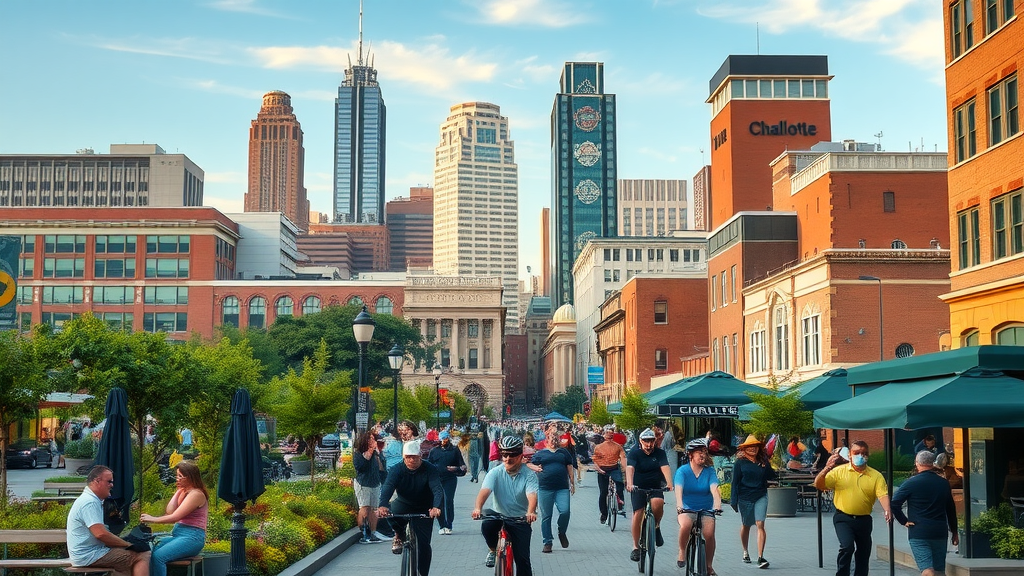
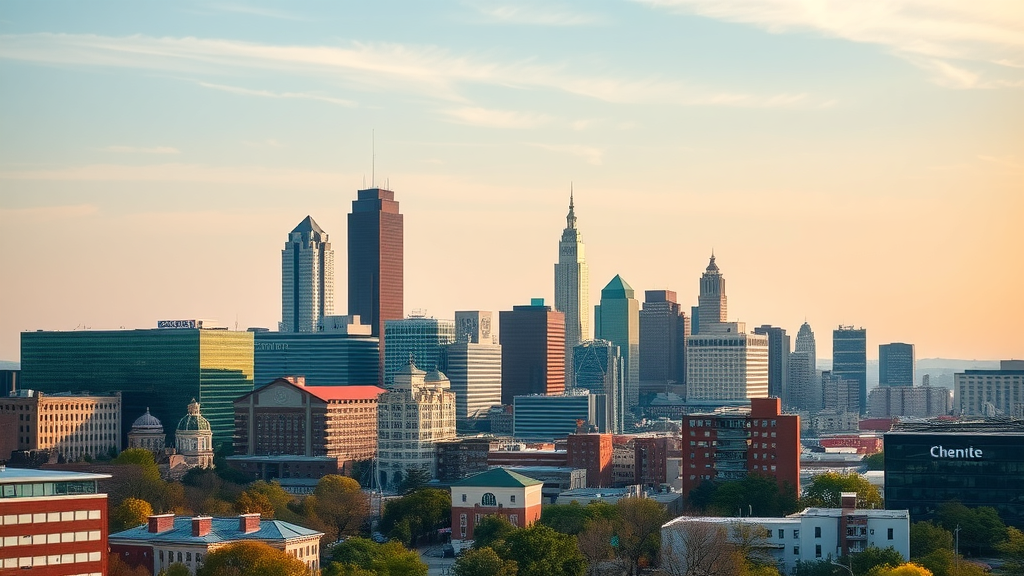

Write A Comment